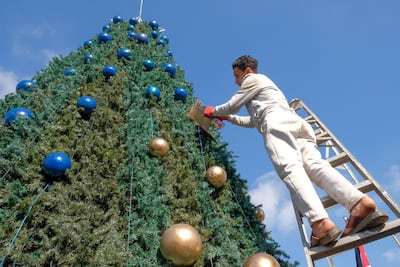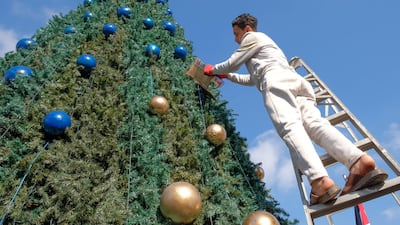A festive atmosphere filled the main square in the Jordanian town of Fuheis this week as 17-year-old labourer Hussam spray-painted a Christmas tree.
The artificial tree in the Christian-majority town of 25,000 on the outskirts of Amman is one of few signs related to Christmas in the country.
The occasion passes relatively unnoticed in Jordan, unlike neighbouring Lebanon, where Christmas is celebrated in a big way.
Several shopping centres in Amman put up trees to attract end-of-year business. Some cafes sell Christmas treats and upmarket grocery stores sell stollen, the German Christmas cake.
The main Christmas market at the Intercontinental hotel this year was cancelled because of the coronavirus.
But Fuheis, nestled in a valley west of the capital, has several Christmas trees in public places.

Their relative ubiquity is because of the presence of many Christians in the town and their municipal influence. In Jordan Christians constitute 2 per cent of the country's 10.4 million population.
Despite the determination of the community in Fuheis to put up Christmas displays, they could not agree on the colour of the tree at the city’s entrance.
Hussam has painted its ornaments three times in two weeks after the municipality changed its mind.
"They first told me to use gold, then to paint blue over the gold, and yesterday they reverted to gold again," Hussam said.
“Apparently blue looked too dull when the tree was lit,” he said.
The indecisiveness did not bother Hussam, who is happy to have found work that paid him the equivalent of $30 a day for a few days.
Putting up and painting the Christmas tree in the square, as well as in two other locations in Fuheis, provided rare employment for Hussam.
Jordan’s harsh economic climate and widespread unemployment worsened this year with the coronavirus.
Hussam lives in the refugee camp of Baqaa north of Amman, home to 100,000 Palestinians and their descendants, most of whom have Jordanian citizenship.
"In Baqaa there is no work, and when there is, it pays less," said Hussam, who studied until the ninth grade.
Traffic at the usually busy square in Fuheis was sparse and even Mujahed, a renowned specialist provider of Jordan's popular kunafe dessert, had no customers.
The only noticeable business was at a fast-food outlet that sells a shawarma meal with fries for about $3.50, and at a bakery for traditional taboon bread baked in a concrete oven.
The old part of Fuheis down the valley was virtually deserted in daytime. A couple of grocery shops were open, as well as an art gallery in a renovated alleyway, owned by the Al Daouds, a family of painters from Fuheis.
“It is busier at night time,” said an employee at the art gallery, pointing to a row of restaurants in the street.
But restaurants have to shut their doors in time for a countrywide lockdown because of the coronavirus. The lockdown starts at 10pm and finishes at 6am.
The restrictions mean a subdued Christmas on Jordanians.
A staff member at the Saint Gregarious Orthodox church said all churches in Jordan had agreed to bring back midnight Christmas Mass to 6pm on Thursday, to stay clear of the restrictions.
A notice at the entrance lists coronavirus measures to be followed by all churches. The number of worshippers will be determined by the size of each church and there is a strict ban on intimate greetings.
For funerals and weddings, no more than 20 people can be inside a church, regardless of its capacity.


